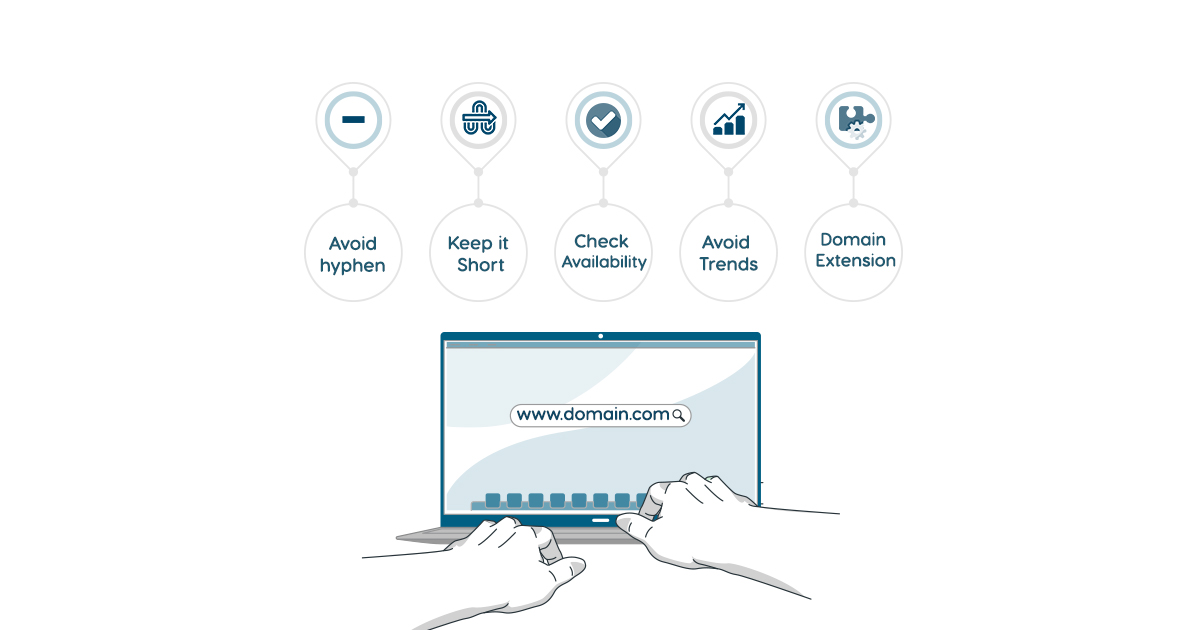Choosing the right domain name is an important step in building your online presence. It is the first thing potential visitors will see and it plays a key role in how easy it is for people to find, remember and share your website. With so many options out there, picking the perfect domain can be overwhelming. Choosing a domain name is like picking a company name, it takes careful thought. Your domain is your online identity, so you want to pick a name that represents your business well and is easy to find and promote. The best domain for you is a custom one that fits your needs. Sometimes, the perfect domain might not follow all the usual rules. With over 700 million registered domains, finding a unique and useful one can be tough. In this article, our WebsCare team guides you through choosing and buying a domain that helps your website stand out and possibly even improve your SEO. Whether you are starting a new website or rebranding, these tips will set you on the right path.
Looking for reliable and free web hosting options in Pakistan? Check out these 6 best services that offer great features and support.
Key Strategies to Help You Select a Domain Name That Boosts Your Online Presence and Brand Recognition
By following these essential tips, you can choose a domain name that not only enhances your brand’s visibility but also ensures a seamless and memorable online experience for your visitors.

Avoid Using Hyphens, Numbers or Double Letters
Avoid using hyphens, numbers, or repeating letters in your domain name. These elements can make your website harder to remember and more prone to typos when people search for it. They also make it tricky to share your domain name clearly in conversations, as they can confuse people. For example, my domain name, www.forank.com, is meant to combine “frank” (straight talking) and “for rank” (ranking websites on Google). However, it’s easy for people to confuse it with “forrank.” To address this, I also purchased the forrank.co.uk domain and set up a redirect. Unfortunately, the .com version was too costly.
Keep it Short and Simple
A short and simple domain name makes your website easier to find, share, and remember. It reduces typing errors and helps create a clean, professional brand image. Long or complex names increase the chances of errors when typing and make the website less accessible. For example, “catcare.com” is more effective than “thebestplaceforcatcare.com.”
Use Keywords Wisely
Keywords in your domain help users and search engines understand what your website is about. For example, a domain like “freshflowers.com” immediately communicates its niche. However, overusing keywords (e.g., “cheapflowersfreedelivery.com”) can make the domain appear spammy, harming your credibility and SEO ranking. Balance is key.
Make it easy to type
Choose a domain name that’s simple and avoids slang or tricky spellings. For example, “express” is clearer than “xpress.” This makes it easier for people to find your site. If your domain is complicated to spell or prone to mistakes, it can frustrate potential visitors and hurt your website’s traffic. To learn more about domains and how they work, check out guides like “What is a domain name.
Make It Easy to Spell and Pronounce
Complicated or uncommon words (like “xylophiles.com”) can be challenging for users to type correctly. A name that’s easy to spell and pronounce reduces friction. For example, “gardenstore.com” is easier to share verbally and write correctly than “gyrdinxstore.com.” Testing your domain by asking friends to spell or pronounce it can reveal potential issues before launch.
Be Memorable
In a sea of websites, a unique domain name ensures your business stands out. Memorable domains are often catchy, simple, and visually distinct. Think of Google or Amazon, they are easy to recall and their uniqueness ensures they are not confused with competitors. Avoid generic names like “beststoreonline.com,” as they blend in with countless others.
Check Availability on Social Media
Brand consistency is vital in today’s digital age. Before finalizing your domain name, ensure the same name or a closely matching version is available on major social media platforms (e.g., Instagram, Facebook, Twitter, TikTok). Consistency across your website and social media accounts helps create a cohesive and recognizable brand. If your domain is “quickcleaning.com” but @quickcleaning is taken on Instagram, users may struggle to connect your online presence. Ideally, your domain and social media handles should match to build a unified brand identity.
Avoid Trends
Trendy words or phrases might seem fun now but can lose relevance quickly. When choosing a domain name, steer clear of trendy words, phrases or slang that might lose relevance over time. Trends come and go but your domain name should remain timeless, adaptable and meaningful for years to come. For example, a domain like “litapparel.com” may not age well as the slang “lit” fades. Instead, choose for timeless terms that retain meaning like “primeapparel.com.”
Test It Out
Before committing, test your domain name in different contexts
| Criteria | Description |
|---|---|
| Verbally | Say it out loud. Does it sound clear? Could someone easily remember it after hearing it once? |
| Visually | Write it down or design a mock logo. Does it look appealing and professional? |
| Feedback | Share it with friends or colleagues. Their input can help catch issues like awkward phrasing or confusing word combinations. |
For example, “kidskitesite.com” may sound clear but looks confusing when written due to overlapping words. Testing can save you from potential branding headaches.
Curious about how web hosting impacts Pakistan’s booming e-commerce industry? Learn more about its crucial role in driving success and growth!
Choose the Right Domain Extension
Select an extension that matches your business purpose, audience, and location. A domain extension is the ending of a web address, like .com or .net. Each extension has a purpose, so pick one that fits your business. For example, .com is the most popular and widely recognized but finding a short and catchy .com name can be challenging since it’s been used for a long time. Country-specific extensions like .uk (United Kingdom) or .ca (Canada) are great for businesses targeting local audiences.
Conclusion
A domain name is more than just a web address; it plays a crucial role in shaping your brand identity and online presence. A well-chosen domain can significantly impact your business by building trust with your audience, improving user experience, and enhancing your online visibility. When selecting a domain, it’s essential to ensure that it is easy to spell, pronounce, and remember, as this reduces the chances of typing errors and helps potential visitors find your site effortlessly. Avoid using complex words, hyphens, or numbers that may confuse users. Additionally, testing your domain by seeking feedback from others can help identify potential issues before launch. Another critical step is selecting the right domain extension that aligns with your business goals and audience expectations. Avoid trendy phrases or slang that may become outdated, as a timeless, relevant domain will serve your business well for years to come. By considering these factors, you ensure that your domain supports both your current and future success.

